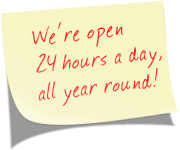Site Menu






10 Tips for Better Emails |
At this point in time, email is becoming the primary avenue of communication for many people all over the world. This includes both professional communication and personal messages to friends and family members. With that in mind, this article has been prepared to provide you with useful tips for writing and preparing better emails.
In regard to preparing and writing better emails, one tip that you will want to keep in mind is the objective of keeping your emails concise and to the point. Often, a person will drone on when it comes to email writing. In the fast paced world of the twenty-first century, the typical email recipient simply does not have a significant amount of time to wade through a bunch of unnecessary information in an email.
The necessity for being concise is of particular importance when it comes to professional communications, to emails written in the course of business. Therefore, you need to take particular care to be concise and direct when you write a business email.
A good number of people who use emails tend to utilize a wide array of abbreviations. While some abbreviations are commonly used and well known, many simply are not. In the end, in your email writing, you would be well served to avoid using abbreviations. The bottom line is that the recipient of an email in which you use a number of abbreviations may not know what you are trying to communicate, or he or she actually may assign a different meaning to an abbreviation that you actually intend.
If you are sending an email for business or professional purposes it is particularly important to limit the use of abbreviations. Indeed, unless it is a very commonly utilize abbreviation, you should not use abbreviations at all in professional or business related emails.
As mentioned above, it is important for you to keep your emails concise. People simply do not have a great deal of time to wade through a long, drawn out email to try and find out what you are writing about.
With that in mind, in addition to being concise, you should also summarize at the start of the email precisely what you are writing about in the body of that communication. This is a necessity in the workplace and when it comes to business or professional emails; there is more leeway when it comes to personal emails. However, even on a personal level it can be helpful and appropriate to summarize the purpose or subject of the email at the beginning of the communication.
Many people fail to use the subject line. If you are interested in making the most out of your email communications, you should use the subject line. With the subject line, you should clearly set out what the topic of the email actually is, so that the recipient will know the purpose of the communication.
In addition, by using the subject line, you can avoid having your email deleted as spam by a recipient who may not regularly communicate with you via email.
Even if you are upset or angry, when it comes to preparing, writing and sending an email, you need to keep your cool and be considerate. You need to understand that an email does not go away. An email can last forever – in both digital and hard copy form. Therefore, you really do need to take all steps necessary to attempt to be as considerate and calm in writing an email, even if you are involved in a situation that has raised your ire.
Generally speaking, you should avoid using attachments when you send out an email. This is particularly the case if you are writing to a person for the first time. Many email recipients fear attachments and will not open them. Indeed, many people will actually delete an email that contains an attachment without even opening it.
The reality is that viruses can be transferred and conveyed via email attachments. With that in mind, you really do need to limit your use of attachments.
Of course, if you have an established relationship with an individual, it becomes more appropriate and safe to exchange attachments via email.
You must avoid being discourteous in your emails at all costs, as an email can be a permanent document. Therefore, you really want to take care not to be angry, rude or offensive in an email, because what you write really does have a possibility of coming back to haunt you at some point in the future.
Many individuals assume that there is a level of privacy associated with email – that actually does not exist. The bottom line is that unless you absolutely know that you are utilizing a secure, scrambled email system, you cannot assume privacy. In fact, your best course is to assume that anyone, any time can access and read any email that you do send.
Another tip that you will want to consider when it comes to better email and better email practices is to respond to your emails as promptly as possible. Do not allow emails to languish in your Inbox. By responding to emails promptly, you will be dealing with issues presented to you in these communications in a timely manner. Moreover, you will not end up with a bunch of emails languishing in your Inbox into the future.
A final tip that you need to keep in mind when it comes to preparing, writing and sending emails is to edit your emails before you click the send button. By taking the time to edit your emails, you can make certain that you are conveying the message that you intend and that there are no errors in your communications that could actually change the nature of the message that you are sending.